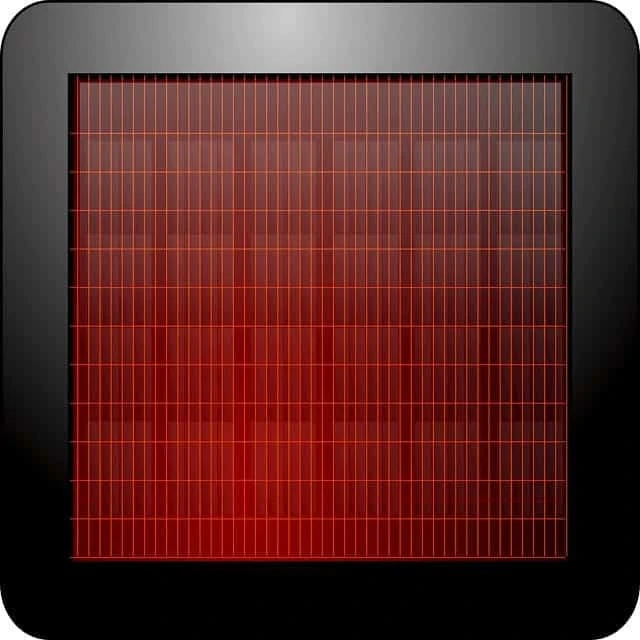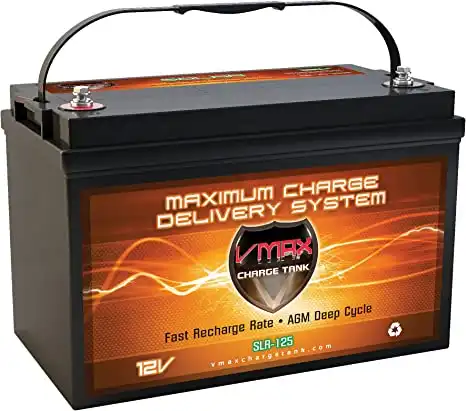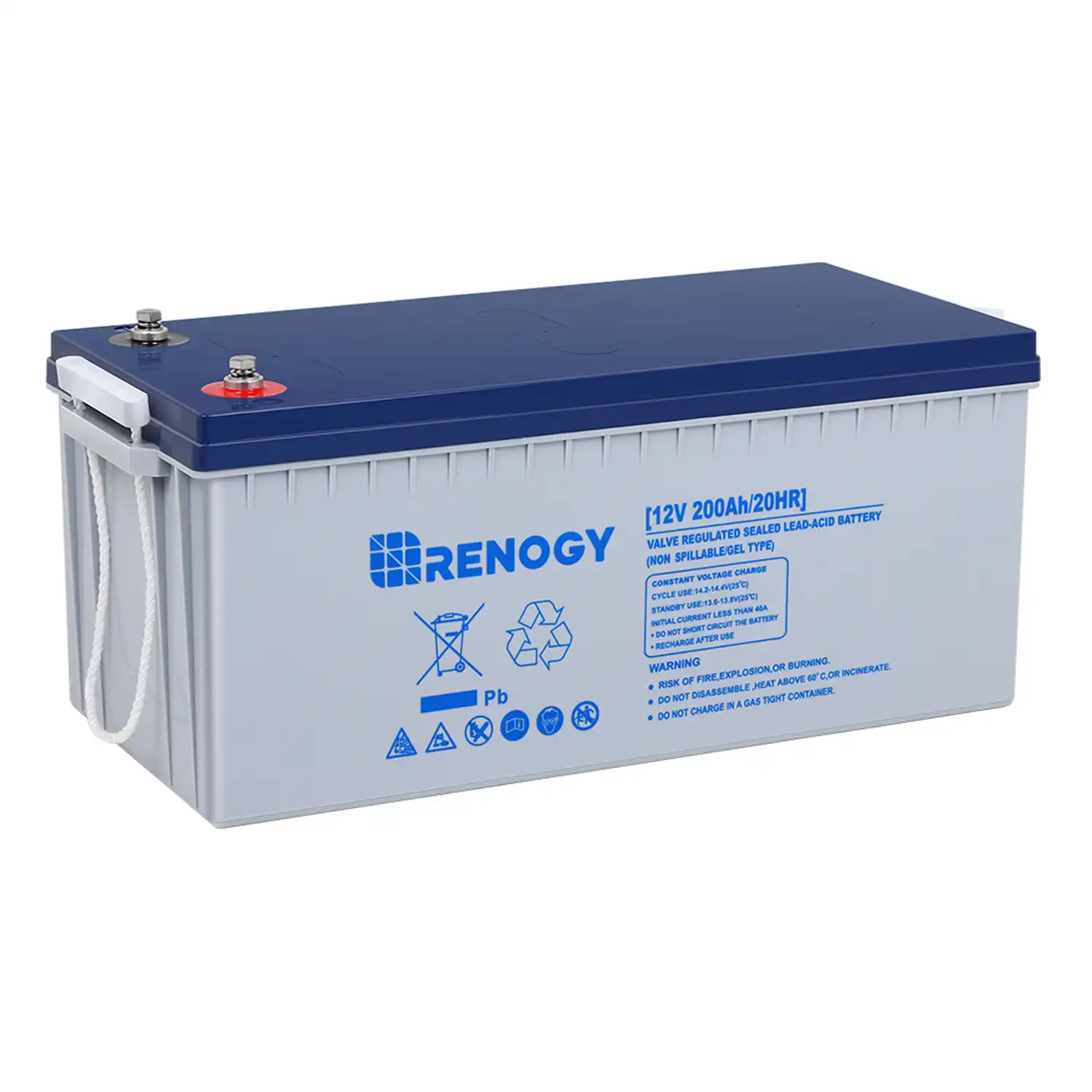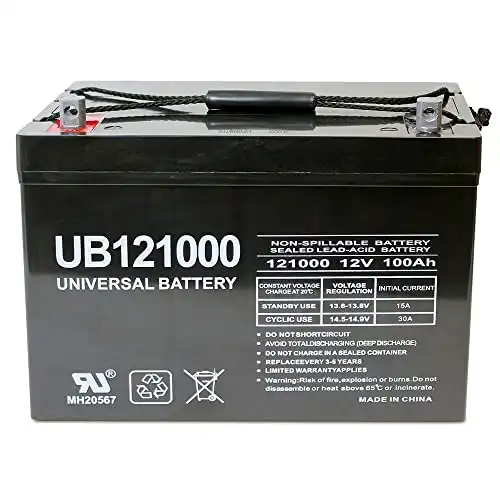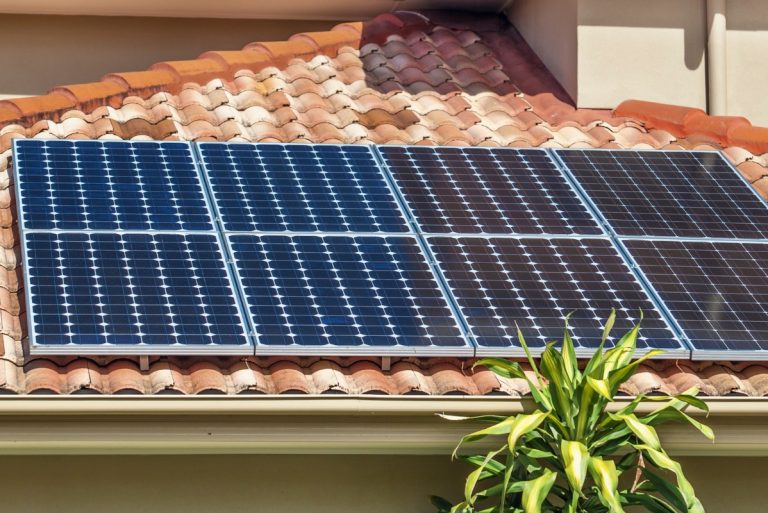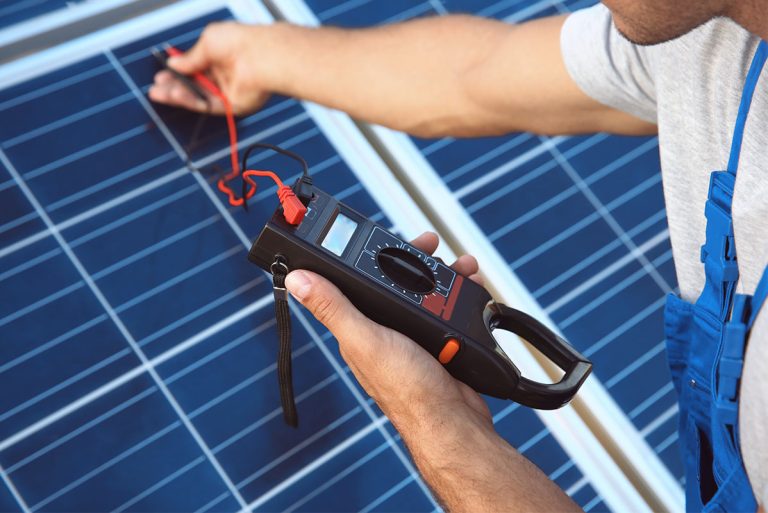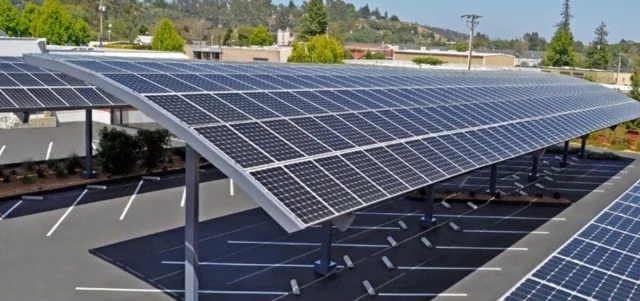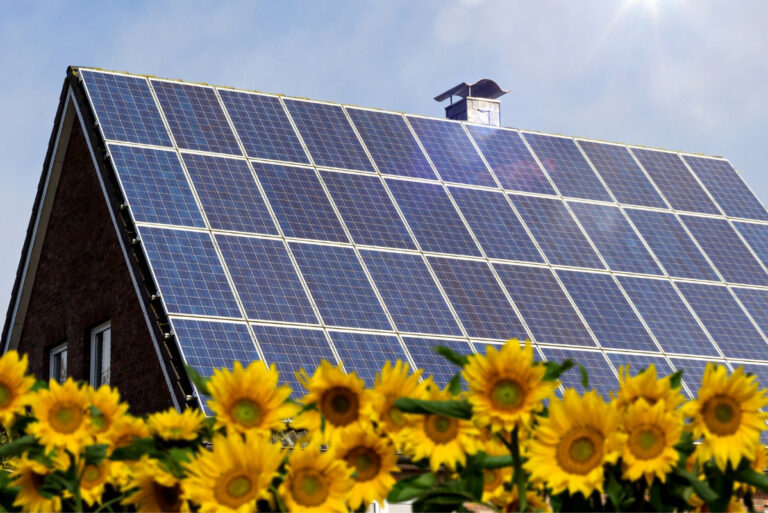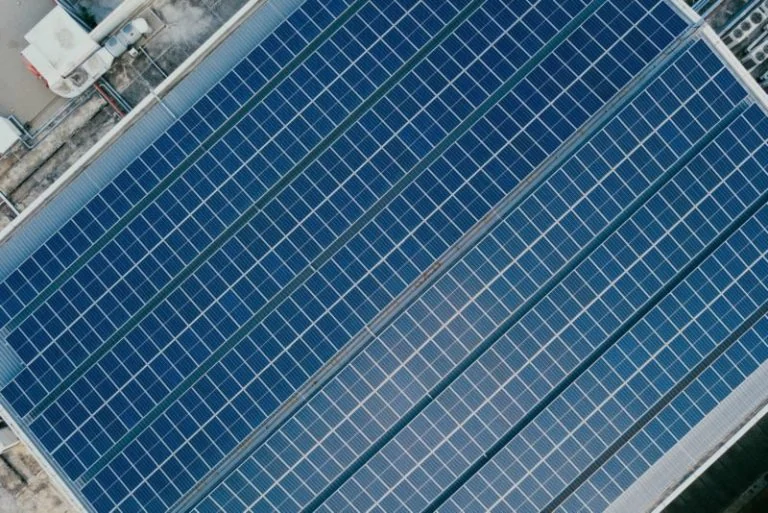Are you thinking of installing a solar power system, or changing your battery storage bank? This guide provides you with everything you require to buy the best solar batteries that won’t disappoint.
In a rush? We think the Vmaxtanks VMAXSLR125 AGM 12V is the best option for most people.
If you are not connected to the utility grid, you need somewhere to store your energy. Having reliable solar batteries will help you save the electricity your solar panels produce during the day.
If you are connected to the utility grid, the batteries will save enough energy to cushion you when shortages in the grid occur.
Being able to identify the best batteries for solar will help you make the right choice whether your solar system is for your RV, your cabin or tiny house or any other setup where you will rely on stored power.
The Vmaxtanks is an excellent battery for storing solar power for your tiny house, camper or home solar system.
The 7 Best Solar Batteries in 2024
Here are some of the best batteries for solar you can choose from in the market. For those living completely off-grid, several brands will suit your solar battery storage needs.
1. Best Overall – VMAXTANKS 12-Volt 125Ah AGM Deep Cycle Battery
With the numerous products bombarding the solar battery market, this is our first choice for an off-grid solar system.
The battery is a deep cycle absorbed glass mat (AGM) battery that ranks among the best solar batteries in the market. It is among the most used deep cycle batteries in the solar storage industry.
With a Float Service lifespan of between 8 to 10 years, this heavy-duty AGM battery offers other numerous features like:
- 12V 125Ah AGM Deep Battery
- Military grade tailor-made plates and an 8mm Hex Screw in Terminals
- Built with 99% recombination capabilities and doesn’t emit any dangerous fumes or gases
- For bulk orders that exceed $150, Bargainshore will offer a Free Signature Confirmation
- The battery is ideal for cold weather, which guarantees your power even at minimal sunlight.
- 8 to 10 years of maintenance-free period
2. Renogy Deep Cycle AGM Battery 12 Volt 100Ah for RV by Renogy
The Renogy Deep Cycle AGM 12 Volt is another excellent solar battery you can use for your system. Although this type of solar battery is bulky and may take a significant amount of space, it is excellent solar energy storage.
Renogy Deep Cycle AGM is easy to install and doesn’t require much knowledge to get it operational.
This type of solar battery doesn’t require any maintenance, and therefore, it needs no monitoring.
Some of the things you should check when using this battery include:
- These batteries should not be deep charged, mainly when they are in series connections
- Always charge the solar batteries with suggested voltages
- The recharge capacity ought to be 1.1 ~ 1.5 * of the discharge capacity
- The batteries are best suited for solar marine, as well as off-grid applications
3. Best Budget – ExpertPower 12v 33Ah Rechargeable Deep Cycle Battery
The 4-stars rated deep cycle battery is an excellent choice for solar battery storage. Most people prefer this product due to its vast benefits.
With the ExpertPower 12V 33Ah battery, you will enjoy the following benefits:
- The battery utilizes the AGM (Absorbed Glass Mat) (AGM) technology
- Wide temperature range
- Genuine ExpertPower Battery – the product trusted mainly by users, and it is among the products with the highest reviews on Amazon.
- User-Friendly – the product has a smooth and one-time installation
- Operational temperature-discharge of between -40 °C to +60 °C and a recharge temperature of between -20°C to +50 °C
- Battery type – It is a 12V 33Ah deep cycle sealed lead-acid battery that has screw in terminals of 7.72(L), 5.16(W), and 6.34(H). Total height is 7.09 inch.
This product is one of the most popular batteries for solar power systems.
4. Battle Born LiFePO4 100Ah 12v Deep Cycle Battery –
LiFePO4 12V is a lithium-ion battery that is safe, strong, and virtually the most reliable deep cycle battery available. These batteries perform better and last longer than any other deep cycle battery.
The 100 Ah LiFePO4 12 battery is the US-made and can qualify for the best battery for a solar system in the market.
The most distinctive features of these batteries include:
- Built from non-toxic materials which are 100% safe
- Can last for 3000-500 cycles with 100% discharge depth
- Operates comfortably in extreme temperatures
- Long lifespans
- 100Amp constant output
- Full replacement warranty of 8 years and a 2-year prorated
- Fast recharge
5. Renogy Deep Cycle Pure Gel Battery 12V 200Ah
Renogy company is a renewable energy firm that produces high-quality batteries which are considered as being among the best solar batteries in the present market. Deep-cycle gel batteries are specially built to serve the off-grid solar power market. These types of batteries will provide maximum storage with any setup.
Since it’s a pure gel battery, you don’t require any maintenance checks or monitoring.
This is possible because of the gel-like substance inside these batteries, and which makes them completely sealed other significant features of these batteries include:
- Patent design construction which guarantees even distribution of the gel electrolyte
- Long lifespan of around ten years and more
- Triples sealed construction
- High-security features, including safety valves, which prevents the battery from producing redundant gas
- Low self-discharge since they use lead-calcium grids alloy, which makes them reliable.
6. Universal Power 12V 100Ah Solar Wind AGM SLA Deep Cycle VRLA, by Universal Power Group
For those looking for a reliable and durable solar battery for their system, then Universal UB121000 12v 100AH is an excellent option.
The battery is a 4.2 star rated on Amazon, and its price is very competitive. These batteries use both gel and AGM technology to make them quite durable and efficient.
However, they offer a 12-month warranty, which is significantly short for a solar battery. The warranty downside is, however, covered by the competitive prices, as well as their numerous benefits.
Its main features include:
- UB121000 12V 100Ah Deep Cycle battery
- The battery dimensions are 12.17 inches by 6.61 inches by 9.16 inches and a weight of 63.93 Lbs
- UB121000 12V 100Ah is maintenance-free and is spill-proof
- Rechargeable can be mounted at any angle, and its shocks and vibration resistant
- The battery can also operate comfortably at various temperatures
Although not as light or small in size as most batteries, this can seem like a minor drawback when you consider the benefits.
Which solar battery best suits you?
Equipped with all the above information, all you need to do now is to determine what your power needs are, along with your budget
If you have these two details, you can easily select from the above list and get tremendous solar battery storage for your solar system.
These are all great options for anyone seeking to use a battery to live off-grid.
What are Solar Batteries?
With unreliable solar battery storage, you will only be able to enjoy solar power when the solar panels are producing it.
Solar batteries are crucial to help you keep your system running.
Moreover, since the panels produce energy during the day, and you may not use all the energy at the time, a stable power bank is essential to store this energy.
With no proper type of solar batteries, you may require to contend with the lack of power, especially if there are outages in the utility grid. To get the best batteries for solar panels, here is a guide for your reference.
Solar batteries refer to devices which store the energy generated from the solar panels for later use. The solar batteries ensure that you can continue to enjoy solar power even after sundown, during a power outage or the energy demand peaks. These batteries can be used in residential properties, as well as in commercial buildings.
Solar batteries play a vital role, especially in the off-grid solar systems. They act as the heart of the off-grid solar system.
When building a solar power system, solar batteries should be a priority as they will determine how effective the system will be to you.
Using the batteries, you optimize your ability to use solar power daily. In instances where you require more energy than your panels produce, you can readily use the stored energy from the batteries.
What is a Solar Panel Battery Pack?
A solar panel battery pack is a package that makes up the solar power storage in a solar system. The first items in the pack are the solar panels that help to collect sunlight energy and change it into DC electricity.
Secondly, it we what the battery system (what you are reading about right now!) that enables the storage of the power the panels produce.
And finally, an inverter which converts the direct current (DC) to alternating current (AC) that is usable in homes.
How Does a Solar Battery Work?
The solar batteries work by storing the energy generated from the solar panels during the day. They save the energy in the form of DC energy and therefore, you will require a power inverter to convert the DC energy into AC energy.
Mostly, you will need either 120V or 230V for use in your home.
Another vital component of solar batteries is the solar charge controller. This helps to ensure that the energy produced during the day does not overcharge the batteries.
Also, it prevents the power stored in the cells from running back to the panels and draining the batteries over the night.
How to Select the Best Batteries for Solar Systems
Whereas there are numerous advantages of acquiring a battery system for your solar, there are also multiple challenges in finding the right ones. The fact that they are expensive and hard to replace after installing the solar system makes it more crucial to choose right.
There are many solar battery types in the market, that may prove challenging to differentiate, and that’s why I will show you the best way how.
The different challenges that occur during the purchase include cost, ease of installation, storage capacity, and battery lifespan, among others.
To save you the struggle, let us delve into it and see how you can choose the best batteries for solar panels.
The Different Categories of Batteries
To better understand how you can easily choose the right solar battery, you should first know the broad classes of these batteries.
There are three options of cells you can choose from which include the sealed lead-acid, flooded lead-acid, and lithium batteries. Let’s go through them one by one to help you understand.
1. Flooded Lead Acid Batteries
For the longest time, the most popular solar batteries for a home have been the flooded lead-acid batteries. This model of solar cells has been in use for over 150 years and has been a great asset, especially to the off-grid systems.
Flooded lead acid batteries, also referred to as wet cells, are very affordable and are also 99% recyclable.
With their design, they can easily handle the daily charge cycling. The significant advantages of these batteries include their low purchase cost, reliability, and safety. However, this category of cells has a good measure of drawbacks.
These batteries are known to produce a byproduct in the form of a gas, and therefore, ventilation is essential where they are located. Another major disadvantage is that they are bulky and corrosive. Also, they demand maintenance checks regularly. The batteries must also be kept in an upright manner to avoid leakage.
Flooded lead acid batteries are made of cells whose plates must be kept underwater for them to function correctly. This is the reason they are referred to as “flooded.” You need to check and add water every after 1-3 months to ensure the plates remain submerged.
For those who don’t mind the regular maintenance and monitoring, these can be the right choice. They are also the most affordable category of solar batteries.
However, due to the multiple drawbacks, many most homeowners are shifting to the use of other models which have fewer maintenance demands.
See Related: Solar Panel Lifespan Guide
2. Absorbent Glass Mat (AGM) Batteries
The second category of batteries is the AGM Batteries. From the early 1980s, this technology started gaining popularity with a sealed lead-acid battery being made for the military vehicles, aircraft, and UPS. These AGM batteries are part of a category of lead-acid batteries called the sealed lead acid.
In this form of a lead-acid battery, a fiberglass matt is used to absorb the electrolyte.
In the AGM batteries, the plates are either flat just like in the flooded lead-acid, or coiled into a spiral resembling those in Optima batteries.
One primary advantage of AGM batteries is that they possess a lower internal resistance than that in flooded cells. Therefore, these batteries can endure higher temperatures, as well as discharge slowly, more than the rest of the batteries.
Unlike the flooded lead cells, the cells in AGM batteries are leak-proof, and they also require less or no ventilation. However, just like the flooded batteries, they use the same charging voltage and tend to be more well-suited for solar electricity systems.
This compatibility means that they can be integrated with flooded cells, although we mostly don’t advocate for the setup due to the negative effect on battery life.
The other advantages of using AGM batteries include the fact that they are not hazardous, their resistant to cold temperatures, and they are relatively lightweight.
Also, they are less prone to heating up (due to the low internal resistance), and they can also preserve a static charge for long periods. AGM batteries, unlike the flooded batteries, have a longer lifespan and just slightly expensive than their counterparts.
Generally, they are an excellent choice for an off-grid solar system.
3. Gel Batteries
Another type of sealed lead-acid batteries is the GEL Battery. These batteries specialize in deep-cycle applications and use fumed silica to form the thickening agent for the electrolyte. The fumed silica helps to make the cells sturdier.
Some other advantages of Gel batteries include that they durable, requires no maintenance, and they have high resistance to vibrations and shock. The cells also work well in both hot and cold temperatures and have great life-cycles. Also, with the viscous electrolyte, the cells become less prone to leakage in case of damage.
Nonetheless, GEL batteries have more disadvantages than the other types of batteries, making them less popular. These batteries are ventless and they self-discharge a bit faster than the flooded cells.
Other common disadvantages of this category of batteries include their narrow charging profiles, and they are easily damaged if charging is not done right.
The batteries also lack ample amp-hour capacity, and their low charging voltage can make them disposed to accidental overcharge.
Especially with solar power systems, electricity generation is a bit variable and can cause this overcharging. In addition to the numerous drawbacks, Gel batteries are also more expensive than the flooded lead-acid batteries.
4. Lithium-ion Batteries
The last category in this list is lithium batteries. They consist of a newer technology that became available from the 1970s and has been in use mostly in cellphones and laptops. However, the cells have become increasingly popular in the renewable energy industry in recent times.
Although more expensive than other types of batteries, lithium batteries offer multiple benefits that compensate for the price.
These advantages include longer lifespan, higher efficient power usage, no maintenance, deeper discharges (more storage capacity), no gas emission, and more. These can typically be the best batteries for solar panels.
In the recent past, people have increasingly shifted from the traditional flooded lead-acid batteries and are more focusing on lithium-based cells.
They are also instrumental in cordless power, including cordless air compressors, and cordless impact wrenches among others. These batteries are small in size and are significantly light judging by their high capacity.
Lithium-ion batteries are easy and efficient to charge, and also, they have long lifespans. The long lifespan is the main advantage of lithium batteries as it ranges from 3000-5000 cycles.
Their high and efficient charge and discharge also is a plus as it helps to optimize the power generation from the solar panels.
The low discharge feature is ideal in solar installations as it helps retain power for more extended periods for later use. With all these benefits lithium batteries are an excellent choice for your solar panel battery bank.
Any solar system, whether small or large, grid-tied or off-grid, lithium batteries are ideal for all. One major disadvantage of lithium solar batteries is their cost.
They can cost as much as four times more than the flooded solar cells. But if price isn’t your main concern, there’s no denying Lithium-ion make for osme of the best solar batteries.
What is the best voltage for your solar battery system?
The voltage question may seem irrelevant, but it is essential. Before you buy and install that battery energy storage system, you should decide which voltage your battery system will be made of.
For example, the batteries can either be 12V, 24V, or 48V. Which fits your needs better? This is something you should be aware of before the installation.
Since it is challenging to change the voltage after installing your power storage system, it becomes critical, therefore, to make the correct choice. The 12V battery is the purest form of battery and the most commonly used one in cars, boats, RVs, and more. If you require a simple power storage system, then the 12V battery system will be enough for you.
Presently the 24V and the 48V storage systems are the most commonly used in the solar systems. The reason behind this is the technical advantages they have as compared to the 12V.
In essence, higher DC voltages translate to lower costs. It also translates to a lower current for a similar amount of power.
For example, 2,000 Watt is equal to 166 amp @ 12V, 2,000 Watt is equal to 83 amp @ 24V and 2,000 Watt is equal to 41.5 amp @ 48V
Moreover, as more and more customers seem to require more energy over the years, the 12V DC system is not ideal. If for instance, your solar panels exceed 500 watts, you should consider a 24V system. On the other hand, if you plan to live off-grid, the 48V system will be ideal.
Use an electrician to help you to determine the optimal performance.
What to Consider When Choosing a Solar Battery
Even with all that information, you may still not be ready to jump into that purchase.
There are several factors you should always research before making that final choice. These features include:
The Size of the Battery
The battery size is the first most crucial thing you ought to consider when buying a solar battery. The size in this context means the energy storage capacity of the battery. Although the physical size of the battery will also matter based on the space you have for installation, the capacity is most important.
When looking at size, you should consider both the capacity and the power rating. For instance, a battery with low power rating and high capacity will only power a few appliances in your home, but for a long time.
On the other hand, if it has a low capacity but high rating power, it will power most of your appliances but for a shorter period.
Therefore, you should look for a battery with high capacity, as well as a high power rating. With this kind of a cell, you can power multiple appliances at your home, and for more extended periods.
Ease of installation
If especially you have no much prior knowledge on the solar systems, you require a battery system that is easy to install. Essentially, it is wise to seek advice on the same from people who have prior experience or professionals.
If you want a battery system that is maintenance-free, easy to install, and that requires relatively low space, the lithium-ion batteries are your best choice.
Don’t go for a system that will consume a lot of space or that will require so much expertise to install. The easy it is to install, the less time it will absorb and most probably, the less installation cost you will incur.
If you have a larger generation need for off-grid applications, you’ll likely want to consider hiring an electrician. This will help ensure that you have the appropriate installation upfront.
Cost
When it comes to purchasing any item, the cost is a significant influencer. In selecting the best batteries for solar power storage, this is no different.
Although not always, price, in most cases, reflect the quality of an item.
Therefore, don’t rush into buying a battery just because it is cheap. You should consider all the other factors and compare them to the price.
As a general view on the solar panel battery cost, the higher the battery costs, the more benefits that come with it.
Charging Time
With charging time, some batteries charge faster than others. Different battery types will have varying charging rates with others being fast and others slow.
If you want to maximize the amount of energy generated from your solar panel system, then you need a fast charging solar battery. For those who care about the rate at which the battery charges, Gel batteries are the best choice for you.
Other categories of solar batteries such as the flooded lead-acid ones, take considerably more extended periods. They can take as long as even a whole day to get fully charged, which is long. Lithium-ion batteries, on the other hand, also have good charging speeds of around 3 hours.
If the battery charges fast, then the better for you as you can use the energy as fast as possible. A combination of an ideal battery and an excellent solar battery charger is vital to guarantee high charging speeds.
We have a full guide to solar battery charging you can check out to learn more.
Manufacturer Warranty
A manufacturer’s warranty is the next most crucial thing that you should take into consideration. Since the solar batteries are significantly expensive, you can’t afford to have a breakdown in the next few years after installation. It is wise to ensure any malfunction that may occur will be sorted.
The longer the warranty period, the best it is for you. Typically, more expensive brands offer more extended warranties than the less known and cheap ones. For solar storage batteries, a reasonable warranty period ranges somewhere from 20-30 years.
The Lifespan of the Battery
The lifespan of a battery means the period the battery will be useful before it loses its ability to hold a charge. You can measure solar batteries’ lifespan in terms of hours, days, or years, and the length depends on the type, size, or brand.
If you need a sure long-lasting and robust battery, be ready to dig a bit deeper into your wallet.
Long-lasting batteries will, in most cases, cost more than the lesser durable ones. Each brand of battery has its estimated amount of time they will remain useful. You should carefully check on this before you decide on the Solar cell to purchase.
Conclusion on Best Batteries for Solar
When it comes to solar power systems, energy storage is of paramount importance. For you to enjoy solar energy, especially if you live off-grid, reliable solar energy storage is a must-have.
In this solar battery buyer’s guide, I believe that you will get everything you need to help you choose the best batteries for solar power to suit your needs.
For most peoples needs we recommend the Vmaxtanks VMAXSLR125 AGM 12V due to their excellent performance, long life span and relative value for money.
If you’re looking for a cheaper option, the ExpertPower 12v 33Ah Rechargeable Deep Cycle Battery is also a solid choice.
We hope you’ve found this guide helpful in deciding which battery to buy.
